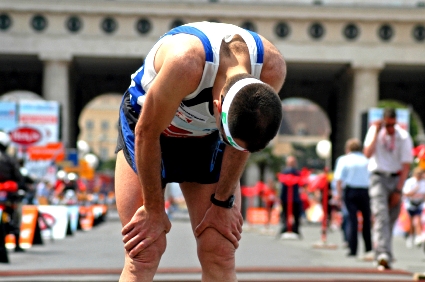I hate running. My lungs wheeze in protest, my muscles cramp
up and my everything sweats. The only good part of running is when it’s over,
and you can drink a couple-dozen gallons of water before hitting the showers
and plopping back down on the couch. So, naturally, I look for any excuse in
the book to avoid the abhorrent activity. Luckily for me, Zeno offers the
perfect excuse: Motion doesn’t actually exist, so why bother?
Reading Zeno, the one aspect of his philosophy that
repeatedly sticks out to me is the concept of infinity. In particular, he goes
through quite the rig-a-marole to prove motion doesn’t exist using the concept
of infinity. Consider Zeno’s first three
(out of four) arguments regarding motion. The first is the Dichotomy, the
argument that “there is no motion” because a given distance between A and B can
be infinitely divided in half (half the distance between A and B, and that half
is divided in half, and so on) (Curd 68). The infinite number of divisions
means that point B can never be reached from point A. Personally, if I were one
of those unfortunate souls who ran the Bear Trail on a regular basis, just the
thought of this argument would be enough to make me strongly reconsider my
daily exercise regimen.
 |
| Infinity? That seems like an awful long time for morning cardio. |
Infinity rears its ugly head yet again in the Achilles
argument. As Zeno describes it, “the slowest as it runs will never be caught by
the quickest [because] the pursuer must first reach the point from which the
pursued departed” (Curd 68). In other words, as a result of Dichotomy, the
pursuer will never reach the point at which the slow runner started because the
distance must be infinitely divided, meaning that the slow runner will always
be ahead of the fast runner. Admittedly, this argument doesn’t particularly
help my cause; all I’d really have to do to win a race (assuming I’d ever start
one) is start a few feet in front of all the faster runners in order to win,
regardless of how agonizingly slow I decided to run. However, the chances of me
reaching the finish line (pesky Dichotomy argument) are pretty much non-existent,
so that doesn’t give me much incentive.
The third argument (which, as it so happens, has no fancy
name like the first two do) states that “if…everything is always at rest when
it occupies a space equal to itself, and what is moving is always ‘at a now,’”
then the moving object in question is motionless (Curd 69). This concept
reminds me of watching an instant replay of a football game frame-by-frame. As
the player moves in space, he is frozen motionless in each individual frame as
the play moves forward. The motionlessness of each frame, though , applies to
all movement (or lack-thereof?); as long as we occupy a space equal to
ourselves and every moment in time is a “now,” then we are not actually moving.
This certainly takes some of the glamour out of instant replays. It also makes
me think that, no matter how much running I do (presumably for my own good), I
won’t actually be moving. This seems to defeat the purpose of running, which is
active motion to get me in shape. As such, really, why bother?
I honestly didn’t understand the last argument (I think it
would’ve required a blackboard and lots of bad doodling), but I’m sure it in
some way proves my point, too. If someone wants to help me prove my point
further, feel free to leave a picture representation (because really, that’s
what it would take) in the comments box below.
At least he didn't say words don't exist.
ReplyDeleteYour post makes me wonder how Zeno actually lived his life. Was he a couch potato or hypocrite?
ReplyDelete